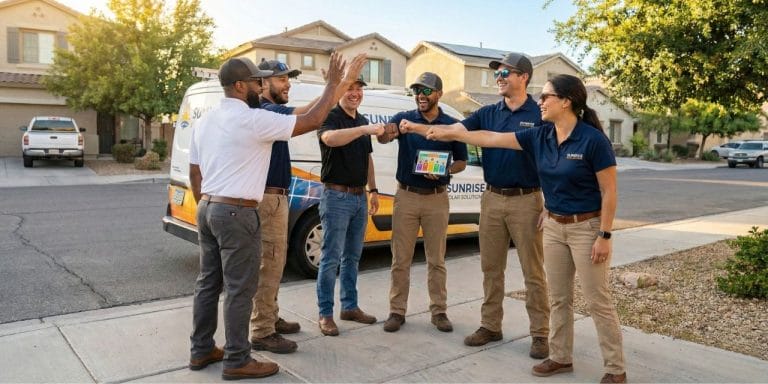When your reps miss quota three quarters running, the problem might not be your product or territory splits. The likely culprit? Accountability. The SPOTIO State of Field Sales Report backs this up:
- 38% of sales leaders cite insufficient activity as the primary reason their reps miss targets
- 24% report problems with reps following the sales process
- Just 57% of sales teams are meeting their appointment goals
But here’s the paradox: field reps need autonomy to be effective, yet they work remotely—often hours from the office. Managers have limited visibility. The solution isn’t more oversight—it’s creating systems where reps hold themselves accountable. Micromanagement kills the independence that makes field reps successful.
This guide breaks down what accountability means in field sales, why traditional approaches fail with remote teams, and seven strategies that work when your reps operate independently.
What Sales Accountability Actually Means
Sales accountability is how you align with your team on goals and expectations so each rep takes ownership of their numbers and process. It means reps take responsibility for their work, solve problems independently, and take initiative instead of waiting for direction.
For field sales, this gets complicated fast. Your reps work alone, often hours from the office. You don’t see them struggling with objections or cutting out early. Without location verification and activity tracking, you’re managing blind.
Real accountability creates ownership—reps stay honest about performance and fix problems before you point them out. But forcing visibility through micromanagement kills the autonomy that makes field reps effective in the first place. That’s the paradox you need to solve.
Why Accountability Matters (and What Happens Without It)
According to the Harvard Business Review, teams with strong accountability are 31% more likely to achieve their goals. They complete quality work, operate with integrity, and align daily actions with company objectives. Accountability builds confidence, creates independent problem-solvers, and drives dedication, retention, and productivity.
Without it? The problems are specific and expensive. Sales managers lack real-time visibility into rep activities and progress, leaving them feeling blindsided. Inefficient route planning wastes time and resources through longer distances and missed appointments. Communication gaps delay information sharing and prevent timely updates. And deals stall out while reps spend only 30% of their day actually selling.
For field teams specifically, poor territory management leads to uneven workloads—some reps are overwhelmed with too many accounts to work effectively while others have insufficient opportunities. Territory overlap causes reps to contact existing customers with acquisition offers, wasting margin and creating inconsistent conversion rates. Your best reps leave for better environments, and the training you invested in never gets applied.
7 Field-Specific Accountability Strategies
1. Make Activity Visible Without Micromanaging
Here’s the tension: field reps need autonomy to be effective, but you need visibility to coach and course-correct. The solution isn’t tracking every movement—it’s tracking the activities that predict outcomes.
Location-verified activities with GPS timestamps show reps you’re measuring work, not watching them. This is different from surveillance. Real-time tracking features should include privacy toggles reps can control, especially for off-hours. Use tracking for newer reps who require closer oversight and to ensure reps are engaging all accounts in their territory.
The psychological shift matters: when reps know their activity is visible, accountability becomes automatic. But when they feel surveilled, motivation drops and they feel overwhelmed rather than empowered. Build systems that show what reps accomplish, not where they are every minute.
2. Focus on Activity Metrics, Not Just Outcomes
We don’t control what the next big trend is or when natural disasters happen. But we do control how many calls we make, follow-ups we send, and doors we knock.
For field sales, focus on controllable daily activities: phone calls made, voicemails left, emails sent, social connections, in-person visits completed. These are leading indicators—they predict outcomes before outcomes happen.
Make goals activity-based when possible. Reps can’t control how many calls turn into sales, but they can control how many calls they make. This gives them autonomy over their success while keeping them accountable to behaviors that drive results.
Map out minimum daily sales activities needed to keep the pipeline full and achieve quota each month. Track performance against these KPIs for each territory—activities performed, result of each activity—to design more balanced territories and allocate them in ways that give everyone the best chance to succeed.
3. Design Territories That Drive Accountability
Poorly designed territories kill accountability before it starts. When workload is unevenly divided, some reps are set up to fail while others coast.
Ask these questions when designing territories: Is workload equally divided? Does the design provide equal compensation opportunities? Is there a good mix of existing and new accounts per territory? Does it allow easy travel time management?
Organizations that adopt effective territory management practices see a 2 to 7% increase in annual revenue growth, according to the Harvard Business Review. But traditional methods fail to keep pace with dynamic needs of modern sales teams, resulting in inefficiencies, lost opportunities, and reduced revenue.
Use territory performance data to refine assignments. Assign reps using insights into revenue generation and lead conversion rates. Clear boundaries reduce disputes over lead ownership, keeping reps organized and focused on assigned targets. Track leads per zone, conversion rate by rep, time spent per door, and margin per acquisition to improve targeting and scale with precision.
4. Use Public Dashboards for Peer Accountability
If there’s one thing that pushes your team harder, it’s being informed about what everyone else is doing and what results they’re achieving. Instead of reporting only to managers, show each rep’s results publicly on a dashboard—that way, everyone knows what the rest of the team is doing, which pushes them to work harder and be accountable for their actions.
When reps see their own performance metrics compared to peers, they’re more likely to take ownership of outcomes, and it sparks healthy competition. The psychology is simple: lateral and reciprocal accountability develops when everyone knows what work each member does and the goals they need to achieve. This peer pressure is often more effective than manager pressure—because reps don’t want to let their team down.
The psychology is simple: lateral and reciprocal accountability develops when everyone knows what work each member does and the goals they need to achieve. This peer pressure is often more effective than manager pressure—because reps don’t want to let their team down.
But here’s the nuance: public dashboards backfire when territories are unbalanced or goals are unrealistic. Before making performance public, ensure everyone has equal opportunity to succeed. Otherwise, you’re just embarrassing reps who were set up to fail.
5. Match Autonomy to Experience Level
Some of your reps don’t need any guidance—they know their customers’ needs and know how to deliver. They could be truly autonomous. But the majority of reps want to do their job right and earn their bonus but need support, guidance, and guidelines from leadership.
The mistake is treating both groups the same. High-performing salespeople earn autonomy through results—they get more freedom to work in ways that allow them to produce outsized results. New or struggling reps need structure, role plays, and direct coaching on fundamentals.
Instead of feeding scripts, use questions that help reps reach answers themselves: “What went well?”, “What could have gone better?”, “How can you improve?” When reps internalize principles behind their actions, they successfully handle future situations and hold themselves accountable.
But here’s the critical part: you can’t give autonomy without visibility. Autonomy needs structure—without it, teams risk inconsistency, missed targets, and misalignment. Field sales leadership is a balancing act between too little oversight and too much micromanaging. The ideal balance is autonomy + accountability: reps set personalized targets aligned with broader objectives, managers get visibility and coaching moments without hovering.
6. Create Continuous Feedback Loops
Giving feedback once a quarter doesn’t build accountability—it builds surprise and resentment. Create continuous feedback loops where reps track their own progress and managers provide real-time course correction.
Provide reps with relevant data showing how their metrics have changed over time—this establishes baseline performance and gives them a reference point for improvement. Reps should track their own progress so performance reviews hold no surprises. If they look at metrics one month and realize they’ve fallen short relative to past performance, they can hold themselves accountable for getting back to baseline.
This data creates a feedback loop showing whether their actions are working, empowering them to make individual adjustments to stay on track. Monitoring the right metrics increases performance by revealing bottlenecks and indicating which strategies work best.
But make it two-way. Ask reps what motivates them and makes them feel engaged. Use these insights to develop strategies matching their work styles. When feedback flows both directions through regular coaching sessions, reps develop skills to evaluate their own performance and hold themselves accountable for continuous improvement.
7. Lead by Example, Not Just Rules
Sales reps can’t be fully autonomous because there’s a bigger picture—a strategy and operational plan that needs to be executed in a coordinated way. But they also can’t succeed if you hover over them daily, making sure they’re following their plans.
The solution is leading with accountability yourself. Be upfront about expectations, give reps the resources they need, take responsibility for mistakes, and meet the same standards you set for your team. Give them space to own their process—let them catch their own mistakes and follow through on their plans.
One field sales VP explained his approach: “I always led by saying, ‘Let me do it first, and I’ll show it to you,’ rather than saying, ‘Go and figure it out.’ If there’s a cold call, I’d make cold calls. If I was available, I’m on the demo with you.” This builds trust and acceptance as a leader before expecting accountability from the team.
When managers coach instead of micromanage, performance improves. The most effective sales organizations don’t choose between autonomy and accountability—they combine them. They treat sellers like professionals with trust, structure, and opportunity.
Use Technology to Automate Accountability
SPOTIO solves the field sales accountability paradox: giving reps autonomy while maintaining visibility. It combines activity tracking, route optimization, territory management, and performance analytics in one mobile-first platform. Teams using SPOTIO report an average 46% productivity—that’s 18+ hours per rep recovered every week.
- Location-Verified Activities: Track field sales activity with GPS coordinates and timestamps. This isn’t surveillance—it’s proof of work that eliminates “where were you?” conversations and reduces time spent on manual tasks that keep reps from spending more than 39% of their time selling.
- Performance Analytics and Leaderboards: Custom reporting on metrics that matter—conversion rates, sales cycle length, team performance. Leaderboards rank performance by activities, appointments, or deals closed, fostering healthy competition that can boost productivity and reduce rep turnover.
- Territory Management: Assign territories using insights into revenue generation and lead conversion rates. Clear boundaries reduce disputes over lead ownership and ensure comprehensive market coverage. Color-coded territory views show performance at a glance.
- Route Optimization: Calculate optimal routes that fit more customer visits into each day.
SPOTIO shows exactly what reps are doing—whether they’re making expected visits but failing to close, or taking too long to reach appointments. This visibility lets you train based on skills rather than effort, targeting coaching where it will have the biggest impact. Managers get complete visibility without switching systems or losing data.
Making Accountability Work for Your Team
The challenge is clear: sales leaders struggle to hold field teams accountable, and the cost shows in missed quotas and wasted productivity. But the solution isn’t more control—it’s smarter systems.
Field sales accountability works when you create visibility without micromanagement, set activity-based metrics reps can control, design balanced territories, leverage peer accountability through public dashboards, match autonomy levels to rep experience, build continuous feedback loops, and lead by example.
Ready to transform your team’s accountability? Book a demo (/demo/) to see how SPOTIO gives you complete visibility into field activity while preserving the autonomy that makes your reps effective.
FAQ
What is sales accountability?
Sales accountability is how managers align with teams on goals and expectations so reps take ownership of their responsibilities and outcomes. For field sales specifically, this means creating systems where reps hold themselves accountable despite working remotely, often hours from the office. Real accountability balances visibility with autonomy—you need to see what reps accomplish without micromanaging their every move.
Why is accountability harder in field sales than inside sales?
Field reps work alone, often far from the office, creating visibility gaps. Sales managers lack real-time insight into rep activities and progress, making it difficult to identify inefficiencies or provide timely coaching. Inefficient route planning, communication gaps, and territory management complexity compound the challenge. Without location verification and activity tracking, managers operate blind—unable to tell if reps are struggling with objections, cutting out early, or working their full territory.
How does accountability improve field sales performance?
Teams with strong accountability are more likely to achieve their goals, and organizations with effective territory management see up to 7% increase in annual revenue growth. When reps have clarity about activity-based metrics they can control and see their progress against peers, they take ownership of outcomes and hold themselves accountable for results.
What are signs of poor accountability in field sales teams?
44% of sales leaders report difficulty holding field salespeople accountable, with 69% of reps missing quota. Specific signs include lack of real-time visibility into activities, uneven workloads from poor territory design, territory overlap causing margin waste, inefficient routes leading to missed appointments, communication gaps delaying updates, and reps spending only 30-39% of their time actually selling.
How do you balance autonomy and accountability with remote reps?
The ideal balance is autonomy + accountability: give reps freedom over how they work while maintaining visibility into what they accomplish. Use location-verified activities with privacy toggles reps can control, not surveillance. Focus on activity-based metrics reps can control (calls made, visits completed) rather than just outcomes. Match autonomy levels to rep experience—high performers earn more freedom through results, while newer reps need structure and coaching. When managers coach instead of micromanage, performance improves.
What metrics should field sales teams track for accountability?
Track controllable daily activities that predict outcomes: calls made, voicemails left, emails sent, social connections, in-person visits completed. For territory performance, monitor leads per zone, conversion rate by rep, time spent per door, skip rates, and margin per acquisition. Track performance against KPIs for each territory—activities performed and result of each activity—to design more balanced territories. These leading indicators reveal bottlenecks and show which strategies work best before outcomes happen.
How do public dashboards improve accountability?
If there’s one thing that pushes teams harder, it’s knowing what everyone else is doing and achieving. Public performance dashboards create lateral and reciprocal accountability—reps don’t want to let their team down. When reps see their metrics compared to peers, they take ownership and healthy competition emerges. But dashboards backfire when territories are unbalanced—ensure equal opportunity before making performance public.
What tools help field sales teams stay accountable?
Field sales platforms like SPOTIO provide location-verified activity tracking with GPS timestamps, route optimization that fits 20% more visits into each day, territory management with clear boundaries and performance insights, and leaderboards that foster competition. Teams using comprehensive platforms report 46% productivity increases within the first quarter—that’s 18+ hours per rep recovered weekly. The key is tools that create visibility without micromanagement, showing what reps accomplish rather than surveilling their movements.
How often should managers check in with field reps?
Create continuous feedback loops rather than quarterly check-ins. Provide reps data showing how their metrics change over time so they track their own progress and performance reviews hold no surprises. Hold regular team meetings where members share successes and seek advice, with one-on-ones for individual coaching. Frequency should match needs—newer reps requiring closer oversight need more check-ins, while high performers with proven results earn more autonomy. The goal is real-time visibility and course correction, not quarterly surprises.
What’s the biggest mistake leaders make with field sales accountability?
Thinking accountability means more oversight. Field sales leadership is a balancing act between too little oversight and too much micromanaging. When sales professionals are held accountable for goals they didn’t help shape through surveillance rather than systems, motivation drops and they feel overwhelmed rather than empowered. The solution isn’t tracking every movement—it’s creating systems where reps hold themselves accountable because they have visibility into their own performance, control over activity-based metrics, and autonomy matched to their experience level.




